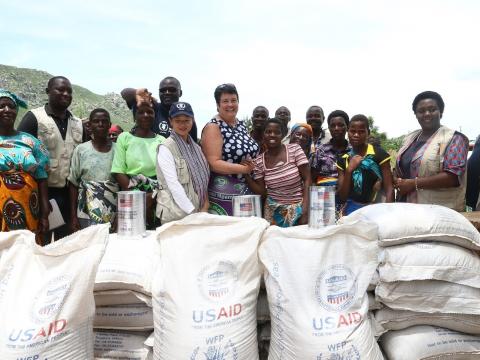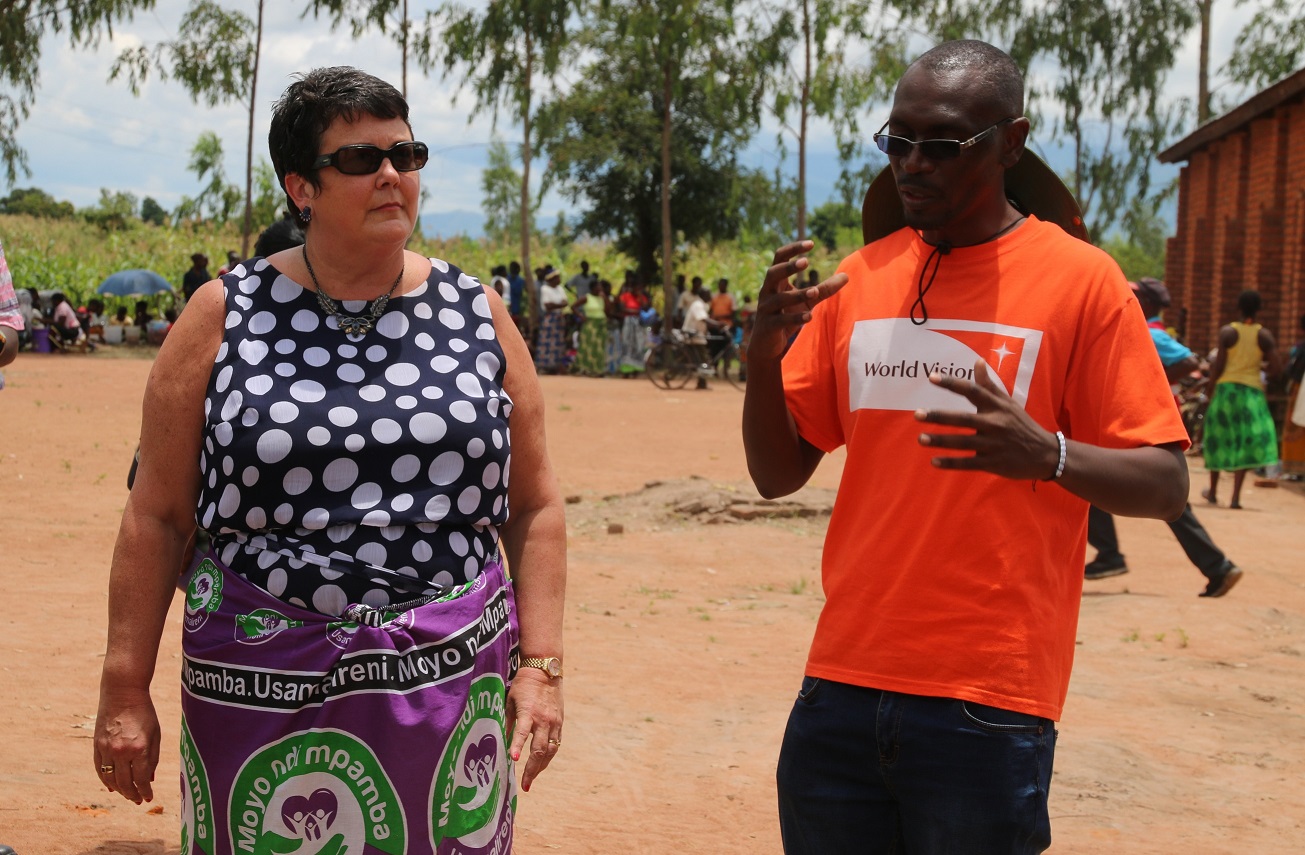US Ambassador Virginia Palmer commends Malawi community for initiatives in food aid programme

Blantyre, Malawi - In a year troubled by one of the worst food shortages in memory, beneficiaries of World Vision’s Southern Africa El Nino Response have gone a step beyond being food recipients to build long-term assets for themselves.
Food aid beneficiaries in Zomba district have capitalized on the food assistance programme to take care of their watershed by planting more trees and creating other community resources, an effort that will benefit their farming activities in the low-lying areas of Kambwiri and Kamondo villages.
From December 2016, 79000 households have been receiving 50 kilograms of maize, two litres of vegetable oil as well as 10 kilograms of peas or beans. On top of this, pregnant and lactating mothers have also been receiving 10 kilograms of corn-soy-blend. The program is expected to run up to March 2017.
Addressing the visiting United States of America Ambassador to Malawi, Virginia Palmer, the community said that it voluntarily heeded the call of World Vision and United Nations’ World Food Programme (WFP) to embark on operations that will benefit them today and into the future.
“Last year’s drought was very bad”, said chairlady for the grouping in Kambwiri village Mathilda Chikoko. “We decided to make use of the energy we got from the food which we have been receiving in beautifying the mountain and improving our soil fertility by planting trees on our mountain”.
Through this, the community has managed to plant different kinds of drought-resilient trees such as nim, gemelina among others around the mountain. They also planted vetiva and dug a water-holding canal to keep water and moisture for the young trees.
“This mountain used to have trees but were all lost them due to charcoal burning”, went on 56-year old Mathilda who blamed poverty and awareness among community members as having been the worst drivers of destruction.
While creating community sustainable assets, the beneficiaries are also investing in their own homes by implementing similar activities in their houses. Mathilda says that having the people plant trees and produce manure, which promotes gardening in their homesteads will help address the challenge that often comes with group work.
“We realized that we were the ones who were hungry and in need so any idea that would transform our lives was so welcome,” said Zione whose vegetable garden is not only providing her family with vegetables to supplement meals but also money through sales.
“After doing farm demonstrations and constructing gardens, World Vision provided us with seeds that we planted in our garden,” she said as she walked around the plot.
Because she would not afford inorganic fertilizers sold in the shops, Zione and her husband applied compost manure they produced on their own after a training by World Vision. Through the money earned from vegetable sales, approximately 500 kwacha a week, Zione is buying sugar and exercise books for her two children attending primary school.
Through the two trainings conducted in their community, Zione and her husband Cassim says that they have also learnt producing and using energy saving stoves. They were also introduced to a village savings and loans program that they expect to benefit from beyond the food aid operation.
These activities are being replicated in 42 more villages in Traditional Authority Mulumbe where 1,850 households are participating. “The rest of those left out of these interventions are the elderly as well as lactating mothers who cannot manage to come and contribute labour at the project sites,” says Elizabeth Kogoya World Vision’s Field Monitor responsible for resilience and recovery operations for Zomba district. She also stressed that all people taking part in the complementary activities are doing so voluntarily.
“It is very interesting to see all the things that you are doing through the programme,” said Ambassador Virginia Palmer as she addressed the community after a brief traditional dance in which she happily participated. “The American people and Malawians have been good friends for years and when the drought hit you, we decided to help in every way that we could manage and it is good to see all the accomplishments that you have made in such a brief period”, she added.
Urging the people to keep working hard for their children, the US Ambassador also thanked WFP and her implementing partner World Vision for a job well done. On the tour of villages, World Vision National Director Hazel Nyathi and WFP’s Country Director Coco Ushiama accompanied the US Ambassador.
World Vision is also implementing the food aid programme in Neno, Mwanza and Chikwawa districts where over one million people are benefiting every month. In all these districts, similar complementary activities are ongoing with support from United States Agency for International Development (USAID), the European Union and other organisations.

